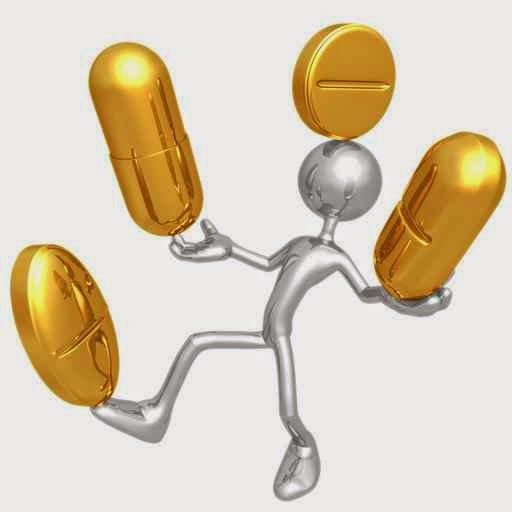In our nutrition class, we have been learning about the advantages and disadvantages of adding supplements to our diet. Whether it has been advertised to boost metabolism, build muscle or to combat disease; adding supplements have become a normal part of most Americans diets. Most of us take supplements in order to consume our daily adequate nutrients; and we believe taking these pills, capsules, powders or liquids will make up for anything we are lacking in the foods we eat.
While
studying our textbook, Nutrition An Applied Approach, I have
been surprised by some of the myths and facts in regards to
supplementation and how it can either help or harm our bodies. Yes,
some supplements can be toxic if we ingest too much. They can also
negatively interact with prescription medicines and cause serious
side affects to those suffering from certain ailments or disease.
The following information is important for everyone using supplements
or considering adding them to their diet.
In the
Dietary Supplement Health and Education Act (DSHEA) of 1994, “Dietary
supplements are categorized within the general group of foods not
drugs.” In other words the regulation of supplements is not as
strict as the regulation on drugs. So as a consumer, we should all
understand the facts about supplement regulation.
- Dietary supplements do not need approval from the FDA before they are marketed.
- The company that manufactures a supplement is responsible for determining that the supplement is safe; the FDA does not test any supplement for safety prior to marketing.
- Supplement companies do not have to provide the FDA with any evidence that their supplements are safe unless the company is marketing a new dietary ingredient that was not sold in the U.S. Prior to 1994.
- There are at present no federal guidelines on practices to ensure the purity, quality, safety, and composition of dietary supplements.
- There are no rules to limit the serving size or amount of a nutrient in any dietary supplement.
- Once a supplement is marketed, the FDA must prove it is unsafe before the product will be removed from the market.
So how
can we ensure that the supplements we are consuming are safe. The
FDA suggests that consumers should practice the following tips. If
you follow these guidelines, it may prevent purchasing supplements
from fraudulent sources which could be detrimental to your health.
- Look for the U.S. Pharmacopoeia (U.S.P.) symbol or notation on the label. This symbol indicates that the manufacturer followed the standards that the U.S.P. Has established for features such as purity, strength, quality, packaging, labeling, and acceptable length of storage.
- Consider buying recognized brands of supplements. Although not guaranteed, products made by nationally recognized companies more likely have well-established manufacturing standards.
- Do not assume that the word natural on the label means that the product is safe. Arsenic, lead, and mercury are all natural substance that can kill you if consumed in large enough quantities.
- Do not hesitate to question a company about how it makes its products. Reputable companies have nothing to hide and are more than happy to inform their customers about the safety and quality of their products.
If you are going to order supplements over the internet, our
textbook, Nutrition An Applied Approach, gives some great
criteria to go through before you purchase.
- What is the purpose of the website? Is it trying to sell a product or educate the consumer? Look for websites that provide educational information about a specific nutrient or product and doesn't focus on just making money.
- Does the site contain accurate information? Remember testimonials are NOT reliable and accurate. Scientific research is the most desirable.
- Does the site contain reputable references? Reputable references come from published scientific journals and should contain detailed information such as; names, journal title, date, volume, page numbers, etc.
- Who owns or sponsors the site? Full disclosure should be made in the “About Us” or “About Me” section of the website.
- Who wrote the information? Once again, full disclosure should be made.
- Is the information current and up-dated regularly? You don't want to be following advice from an article that was written several years ago. Supplements and health information change so rapidly that most statistics from a few years ago are no longer relevant today.
It is crucial for your health to not take supplements for any of the
following reasons:
- Adding fluoride supplements for children who already drink fluoridated water.
- Taking supplements with certain medications that can have a negative interaction. One example is people who take Coumadin should not take vitamin E or K because it can cause excessive bleeding.
- Taking non-prescribed supplements if you have liver or kidney disease.
- Taking beta-carotene supplements if you are a smoker as it can increase the risk for lung and other cancers.
- Taking supplements to increase your energy level. Vitamins and minerals do not contain fat, carbohydrates or protein which is our major source of energy.
AND REMEMBER ~ YOU ARE WHAT YOU EAT . . .
Namaste, Beci
Reference:
Thompson, J., & Manore, M. (2006).
The Role of Nutrition in Our Health. In Nutrition An Applied
Approach. San Francisco: Pearson
Education.




